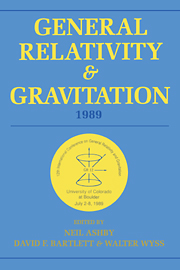 General Relativity and Gravitation, 1989
General Relativity and Gravitation, 1989 Book contents
- Frontmatter
- Contents
- Preface
- Conference committees
- Part A Classical relativity and gravitation theory
- WORKSHOPS
- Part B Relativistic astrophysics, early universe, and classical cosmology
- WORKSHOPS
- B1 Mathematical cosmology
- B2 The early universe
- B3 Relativistic astrophysics
- B4 Astrophysical and observational cosmology
- Part C Experimental gravitation and gravitational wave detection
- WORKSHOPS
- Part D Quantum gravity, superstrings, quantum cosmology
- WORKSHOPS
- Part E Overviews-past, present, and future
B1 - Mathematical cosmology
Published online by Cambridge University Press: 05 March 2012
- Frontmatter
- Contents
- Preface
- Conference committees
- Part A Classical relativity and gravitation theory
- WORKSHOPS
- Part B Relativistic astrophysics, early universe, and classical cosmology
- WORKSHOPS
- B1 Mathematical cosmology
- B2 The early universe
- B3 Relativistic astrophysics
- B4 Astrophysical and observational cosmology
- Part C Experimental gravitation and gravitational wave detection
- WORKSHOPS
- Part D Quantum gravity, superstrings, quantum cosmology
- WORKSHOPS
- Part E Overviews-past, present, and future
Summary
The workshop on mathematical cosmology was devoted to four topics of current interest. This report contains a brief discussion of the historical background of each topic and a concise summary of the content of each talk.
The observational cosmology program
The standard approach for analyzing cosmological observations is to assume that space-time is isotropic and spatially homogeneous (i.e. that the cosmological principle holds). It then follows that the universe can be described by a Friedmann-Lemaitre-Robertson-Walker (FLRW) model, and the aim is to use the observations to determine the free parameters that characterize such models. A fundamental question, however, is whether ideal cosmological observations on our past null cone can be used to actually determine the geometry of the cosmological space-time, without introducing a priori assumptions about the geometry. This question provides the rationale for the observational cosmology program, as described by Ellis et al. (1985). In this paper it was shown that ideal observations alone do not determine the geometry of spacetime. For example, even if all observations are isotropic about our position, it does not follow that the spacetime is spherically symmetric about our position. However, if the Einstein field equations (EFEs) are assumed to hold, then ideal observations do determine the spacetime geometry off our past null cone.
In the workshop, W. R. Stoeger reported on work in progress with S. D. Nel and G. F. R. Ellis concerning the observational cosmology program.
- Type
- Chapter
- Information
- General Relativity and Gravitation, 1989Proceedings of the 12th International Conference on General Relativity and Gravitation, pp. 241 - 246Publisher: Cambridge University PressPrint publication year: 1990


